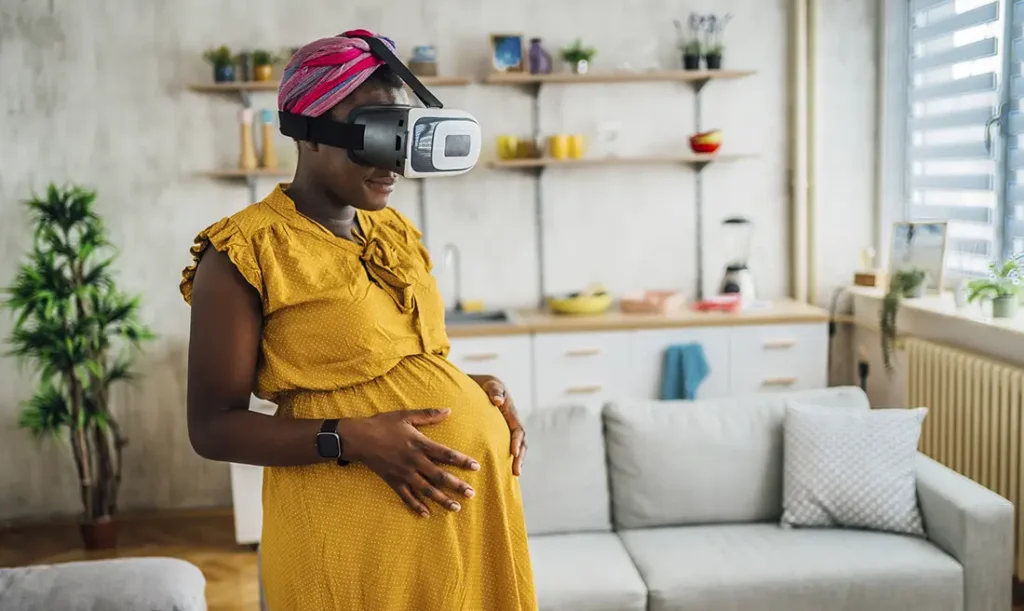Author: Judite Blanc, Ph.D. | July 26, 2024 | 6 min read | Share
The Miller School assistant professor of psychiatry and behavioral sciences described the “Nurturing Moms” study, which she conducted in collaboration with the Media Innovation Lab.
Dr. Judite Blanc published the National Institute on Minority Health and Health Disparities Insights, “Could a Virtual Reality-Based Stress Reduction Intervention Be a Breakthrough for Addressing Intersectional Stress in Minority Women?”
This article is reprinted here in its entirety with permission from NIMHD.
My journey into the field of stress research and disaster mental health began after giving birth as a first-time mother after surviving the most devastating Haiti earthquake in 2010, which claimed over 200,000 lives. At the time, I was halfway through a master’s degree in developmental psychology. I was scared for our safety and too scared to hide under the bed, so I grabbed my baby and rushed to the closet. As the room shook and my baby was crying, I thought we were going to die alone. We weren’t hurt, but every aftershock terrified us that our house would collapse.
After the earthquake, like thousands of displaced people, we left Haiti for safety in Florida for a month or two, but I knew there was a place for me in Haiti, so in March 2010, I returned and joined the Haitian Trauma Center, which was established to help survivors heal.
I enjoyed working with displaced children; however, I was also curious about the validity and cultural limitations of the Western-centric theoretical framework that inspired our intervention. I won a scholarship to complete a graduate course in Psychopathology and Health Psychology in France, where I received extensive training in traumatic stress research. The findings of my doctoral dissertation project highlighted the urgent need for comprehensive trauma-focused programs for perinatal women, mother-child dyads, and school-age children who are survivors of traumatic events.
A few years after the disaster, I moved to the United States, where I was confronted with another tragic reality: Black women and their children suffer disproportionately from health disparities, regardless of their education level. For example, the maternal mortality crisis in the United States is hitting black women the hardest, at rates comparable to those in low- and middle-income countries, making it a national public health emergency. This realization further fueled my passion to work to address these disparities.
Evaluating the effects of a virtual reality program on maternal stress among perinatal women of color.
Perinatal mental health issues contribute to complications and maternal mortality during pregnancy and childbirth. Studies show that 15% to 20% of pregnant and postpartum women in the United States suffer from mood or anxiety disorders. However, this mental health crisis does not affect all racial and ethnic groups equally. Women, particularly Black women from marginalized communities, are disproportionately affected, highlighting the complex interplay of race, ethnicity, gender, and socioeconomic status.
Dr. Judith Blanc
Mom is using the NurtureVR headset and controllers in her hospital room to relax and learn.
In response to this crisis, in 2022 the Media Innovation Lab and I conducted the ongoing “Nurturing Moms” study at the University of Miami Miller School of Medicine. Our study evaluates Nurture VR™, a virtual reality (VR)-based pregnancy-related education program that integrates mindfulness techniques, relaxation exercises, and guided imagery, among perinatal Black and Latinx women. VR uses computer modeling and simulation to allow participants to interact with a simulated 3D visual or sensory environment.
During the qualitative phase of our recent research, we learned about the specific challenges volunteers face, including time management difficulties, caregiver burden, financial strain, lack of sleep, social pressures, lack of social support, post-traumatic stress, and inadequate health insurance.
While conducting the focus groups, I was struck by the contrasting perspectives of the participants: Some Latina women emphasized their inherent resilience as mothers, while Black participants expressed frustration with societal expectations of the stereotypical “strong Black woman.”
“The idea that even if the day is tough, you just have to keep going. You’re a mom. Your kids need you, so you have to persevere and do your duty. And at the end of the day, when you want to unwind and go to sleep, you end up scrolling through your phone because that’s the only time you have.”
– Hispanic, pregnant with one child
“Black women everywhere have to be strong, but I can’t stand to hear why we have to be the only ones who have to be strong, why other people can cry, express their emotions, feel, but we have to be the only ones who always have to be strong.”
– Haitian-born pregnant woman
The women’s responses highlight the nuanced experiences in different cultural contexts. In addition, there were differing opinions about zuranolone, a new drug for postnatal depression. Some participants supported complementary medicines, while others expressed a strong interest in them due to limited access to mental health professionals.
Many of the study participants provided positive feedback, highlighting that VR’s immersive nature has proven effective in engaging participants and creating unique experiences through guided imagery and relaxation techniques. For example, a pregnant or new mother can choose an educational module or guided imagery while wearing a VR headset to allow herself to be captivated by the rhythmic waves of a beach or the tranquility of a green space. This experience can boost mood and help her focus, learn, and maintain a positive experience.
A prominent theme that emerged was participants’ sense of escapism. The portability and on-demand nature of VR-based interventions make them valuable assets for low-income communities, where transportation challenges, cultural barriers, and stigma surrounding mental health can significantly hinder marginalized populations from accessing quality mental health services.
Culturally tailored and affordable VR-based interventions have the potential to mitigate these barriers, thereby contributing to reducing social determinants of health stress for women and mothers of color.
Tags: Dr. Judith Brun , pregnancy , psychiatry and behavioral sciences , stress management , virtual reality

